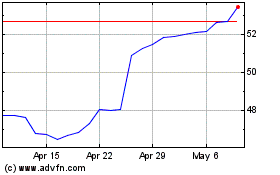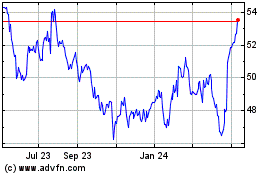Kraft Heinz Needs a Deal, But Can It Really Afford Unilever? -- Heard on the Street
February 17 2017 - 2:29PM
Dow Jones News
By Stephen Wilmot and Paul J. Davies
Even at the lowball price Kraft Heinz Co. has offered, buying
soap-to-soup giant Unilever PLC would stretch its balance sheet to
its limits. But the U.S. food group needs a deal.
Investors cheered news of the potential acquisition, sending
Kraft Heinz shares up 8% at the open. 3G Capital -- the Brazilian
investment firm that teamed up with Warren Buffett 's Berkshire
Hathaway to buy Heinz in 2013 and then merged it with Kraft two
years later -- is a legendary costcutter. Kraft Heinz's operating
margin last year was roughly 23%; before the merger Kraft's was
10%.
But it will take an aggressive sleight of hand even by 3G's
standards to acquire Unilever, which has roughly the same
enterprise value as Kraft Heinz.
Unilever said the U.S. food group had proposed $30.23 a share in
cash, plus 0.222 new shares, equivalent to $20.80 after the Friday
morning pop. Kraft Heinz already has $29 billion of net debt, and
would need to take on a further $90 billion to fund the cash
portion of the deal. Add in Unilever's debt, and the combined total
rises to $132 billion -- about 7.5 times combined earnings before
interest, taxes, depreciation and amortization.
That is a much higher leverage than in last year's
consumer-goods megadeal: Anheuser-Busch InBev's purchase of
SABMiller to create the world's biggest beer maker. The comparison
is apt because the beer giant was built by Carlos Brito, who
formerly worked for the three billionaires that run 3G Capital.
Before cost savings, ABI's near-$110 billion offer was expected to
leave the combined company with net debt at about 4.5-times
forecast Ebitda.
If Kraft Heinz succeeds in buying Unilever, axing costs would
boost expected profits. The London-based company has made much of
its use of "zero-based budgeting" -- the cost-cutting tactic
favored by 3G -- but its operating margin last year was 14.8%, well
below the level at Kraft Heinz or ABI. That said, finding savings
is much easier in the merger of two brewers than two producers of
packaged food -- and other products. Food, in which Kraft Heinz
specializes, accounts for only 43% of Unilever's portfolio, notes
Citi.
The debt-averse Warren Buffett might intervene to make the deal
possible. Berkshire Hathaway owns 26.8% of Kraft Heinz, has roughly
$85 billion in cash and helped fund the Kraft-Heinz merger. That
may explain the apparent lack of concern among Kraft Heinz's
independent shareholders.
However, a higher bid is needed. The $51 dollar-a-share offer
values Unilever at roughly 15.4 times expected Ebitda, compared
with almost 21 times for SABMiller. This month Unilever's
U.K.-listed peer Reckitt Benckiser offered 19 times for U.S.
infant-nutrition company Mead Johnson, calculates Barclays.
The food group is motivated by an inexorable logic: There is
little growth in consumer products, so the model appears to be:
Buy, cut costs and buy again. Kraft Heinz believes it needs a big
new target. It will likely prove a determined hunter.
Write to Stephen Wilmot at stephen.wilmot@wsj.com and Paul J.
Davies at paul.davies@wsj.com
(END) Dow Jones Newswires
February 17, 2017 14:14 ET (19:14 GMT)
Copyright (c) 2017 Dow Jones & Company, Inc.
Unilever (NYSE:UL)
Historical Stock Chart
From Mar 2024 to Apr 2024

Unilever (NYSE:UL)
Historical Stock Chart
From Apr 2023 to Apr 2024
